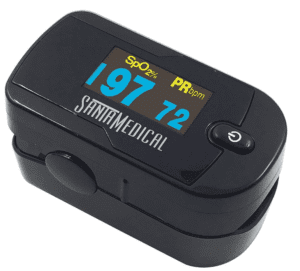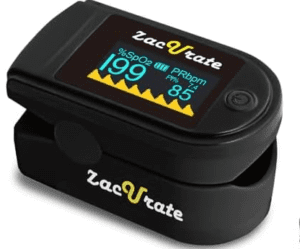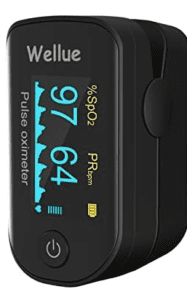Pulse oximeters offer a quick, non-invasive way to monitor your blood oxygen levels (SpO2) and heart rate. Whether you have a chronic health condition, are interested in fitness tracking, or want peace of mind, the right pulse oximeter can be a valuable home health tool.
Remember, always consult your doctor before purchasing and using a pulse oximeter. Let’s explore the best pulse oximeters of 2024 and guide you to the perfect fit!
Best Pulse Oximeters 2024
SantaMedical Finger Pulse Oximeter

- Description: A budget-friendly pulse oximeter offering essential blood oxygen and heart rate readings in about 10 seconds. It boasts 30+ hours of battery life and a compact design.
- Accuracy: +/- 2%
- Display: Simple LED display
- Comfort: Lightweight and suitable for short-term monitoring
- Pros: Very affordable, long battery life, easy to use.
- Cons: It lacks advanced features (Bluetooth, continuous monitoring), and the display may be difficult to read in bright light.
- Overall: A solid choice for those needing basic measurements without extra bells and whistles.
Zacurate 500C Elite Fingertip Pulse Oximeter

- Description: Designed for active users, this pulse oximeter delivers readings in 10 seconds or less with 30+ hours of battery life. It features a durable build with a silicone cover and a transparent OLED display.
- Accuracy: +/- 2%
- Display: Rotatable OLED display (shows readings in multiple directions)
- Comfort: Comfortable design suitable for sports and outdoor activities.
- Pros: Accurate, durable, versatile display for easy reading.
- Cons: Slightly higher price than basic models, still lacks advanced features.
- Overall: A reliable choice for athletes or those needing a more rugged pulse oximeter.
Innovo iP900AP Deluxe Pulse Oximeter

- Description: This pulse oximeter prioritizes speed, delivering readings in about 5 seconds with a 40-hour battery life. Includes a plethysmograph and perfusion index for additional health insights.
- Accuracy: +/- 2%
- Display: Color LCD
- Comfort: Standard fingertip design, comfortable for short-term use.
- Pros: Speedy readings, offers more health data, extended battery life.
- Cons: More expensive; extra features may be unnecessary for some users.
- Overall: Best for those interested in additional metrics and faster readings.
Wellue Bluetooth Fingertip Pulse Oximeter

- Description: Offers Bluetooth connectivity for easy data tracking and sharing using a smartphone app. User-friendly with a clear display and adjustable brightness.
- Accuracy: +/- 2%
- Display: OLED display
- Comfort: Standard, comfortable fingertip design.
- Pros: Convenient Bluetooth feature, easy data management, customizable display.
- Cons: Pricier, requires a smartphone for full functionality.
- Overall: A smart choice for those interested in tracking their health data over time.
Buying Guide Tips
Factors to Consider
- Accuracy: The most crucial factor! Look for pulse oximeters with accuracy within +/-2%. Readings should closely match hospital-grade equipment.
- Features: Consider which features are essential to you:
- Display: Do you prefer a simple LED or a more informative LCD/OLED with adjustable brightness?
- Alarms: Audible alarms for low oxygen or irregular heart rate can be useful.
- Continuous monitoring: Ideal for overnight tracking or for those with chronic conditions.
- Bluetooth & App Support: Allows easy data tracking, storage, and sometimes advanced analysis.
- Additional Metrics: Some offer a plethysmograph and perfusion index for more health insights.
- FDA Approval: Choose a device with FDA approval to ensure reliability and safety.
- Price: Pulse oximeters range in price. Determine your budget and balance cost with the features you need.
- Ease of Use: A straightforward design is beneficial, especially for those without tech experience.
- Comfort: If you plan on long-term monitoring, choose a device with a comfortable fit.
- Warranty: A good warranty provides peace of mind in case of defects.
Types of Pulse Oximeters
- Fingertip: The most common. Easy to use, portable, and generally affordable. Best for spot-checking oxygen levels and heart rate.
- Wristband: Designed for continuous monitoring, often worn during sleep. It may offer additional features like sleep tracking.
- Handheld: Larger devices with more advanced features. Typically used in clinical settings by healthcare professionals.
Conclusion
Owning a pulse oximeter lets you keep a closer eye on your health. Whether you’re managing a chronic condition, striving for fitness goals, or want peace of mind, this tiny device can provide valuable insights into your heart rate and blood oxygen levels. Remember, it’s always essential to consult your doctor before using a pulse oximeter and correctly interpret the readings.
Owning a pulse oximeter empowers you to keep a closer eye on your health. Whether you’re managing a chronic condition, striving for fitness goals, or simply want peace of mind, this small device can provide valuable insights into your heart rate and blood oxygen levels.
If you have asthma, a pulse oximeter can help you monitor potential triggers and identify early signs of an attack. For those with sleep apnea, it can help you assess the effectiveness of your treatment.
The sooner you start monitoring your health, the better you are to manage any changes and take proactive steps towards wellness.
Don’t wait any longer to take charge of your health monitoring. Explore the options outlined above, consider your needs, and find the best pulse oximeter. Invest in your well-being today!







